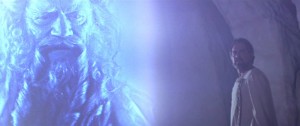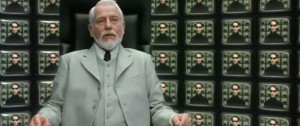 There are a lot of things to like about Prometheus. The set design is very beautiful and feels real and physical for a film made in 2012 that is quite so reliant on CGI. Most of the performances are fine, some excellent. The world it creates is clearly much larger than the film itself, and it feels very much as if we’ve only seen a part of it. And while it does (sort of) serve as a prequel to Alien, it is similarly quite refreshing that it doesn’t tie itself too closely into lining itself up seemlessly to end where that film begins.
There are a lot of things to like about Prometheus. The set design is very beautiful and feels real and physical for a film made in 2012 that is quite so reliant on CGI. Most of the performances are fine, some excellent. The world it creates is clearly much larger than the film itself, and it feels very much as if we’ve only seen a part of it. And while it does (sort of) serve as a prequel to Alien, it is similarly quite refreshing that it doesn’t tie itself too closely into lining itself up seemlessly to end where that film begins.
None of that is to say that there aren’t problems, but most of them would have been fixable if they’d taken the trouble to get a half-decent script editor to take a look at it. This is a real shame. A line of expositionary dialogue here, deleting a line of dialogue there (the attempt to over-egg Noomi Rapace’s “pregnancy” by revealing she was infertile was especially clunky), and most of the truly facepalm moments would have simply vanished. But the fundamental problem with the film was in the concept itself: “meeting God” films never work.
 There are two problems with “meeting God” films. The first one is: they all end up resembling the Wizard of Oz. In the case of Zardoz, that is of course deliberate, but the trope runs the same way throughout. Essentially, the protagonists set themselves the task of meeting God, “God” turns out of have feet of clay, everyone gets upset and we have a stunning anti-climax. It wrecked Star Trek V. It fucked the Matrix franchise (thanks to my wife Alex for that one). Name me one film with this premise is loved and respected or has stood the test of time. They’re doomed to failure because the premise always promises more than any film can deliver, no matter how good the special effects. And if you don’t go for the cynical, God-ain’t-all-that, route, you will have to contend with the audience – who will either be profoundly sceptical themselves or, worse, declare you to be a heretic and decide you should be burnt at the stake. It is a dramatic dead end.
There are two problems with “meeting God” films. The first one is: they all end up resembling the Wizard of Oz. In the case of Zardoz, that is of course deliberate, but the trope runs the same way throughout. Essentially, the protagonists set themselves the task of meeting God, “God” turns out of have feet of clay, everyone gets upset and we have a stunning anti-climax. It wrecked Star Trek V. It fucked the Matrix franchise (thanks to my wife Alex for that one). Name me one film with this premise is loved and respected or has stood the test of time. They’re doomed to failure because the premise always promises more than any film can deliver, no matter how good the special effects. And if you don’t go for the cynical, God-ain’t-all-that, route, you will have to contend with the audience – who will either be profoundly sceptical themselves or, worse, declare you to be a heretic and decide you should be burnt at the stake. It is a dramatic dead end.
 But this links to the other problem. Fundamentally, nobody wants to actually meet God. I mean, not physically, actually meet him (as opposed to some metaphysical, spiritual, vague, non-specific communion with God in this life or after). The problem, at its heart, is the cosmological argument. Once you’ve found “God”, the first question you have to ask yourself is “who created him/her/it?” At best all you’ve discovered is the latest in a long line of “creators”: it is literally turtles all the way down.
But this links to the other problem. Fundamentally, nobody wants to actually meet God. I mean, not physically, actually meet him (as opposed to some metaphysical, spiritual, vague, non-specific communion with God in this life or after). The problem, at its heart, is the cosmological argument. Once you’ve found “God”, the first question you have to ask yourself is “who created him/her/it?” At best all you’ve discovered is the latest in a long line of “creators”: it is literally turtles all the way down.
As a good Catholic, this argument should have been very, very familiar to Noomi Rapace’s character; yet it is never even touched upon in the film itself. The film makers are simply too in love with the idea to see past its inherent nonsense. Instead, what we get is a bunch of people spouting about Däniken theory as if it is holy scrit on the rather shaky basis that they “choose to believe it”. It is a caricature of a scientist with religious sensibilities (and what odd, blasphemous religious sensibilities to have?), that I doubt even Richard Dawkins actually believes really exists.
If we assume for a second that Däniken is right and that space astronauts came to earth and engineered the human race, that would throw up all sorts of philosophical issues for us as a species were we to find tangible proof. There’s a lot of potential for great drama there. But it wouldn’t disprove the existence of God; nor would it, as one character mentions in the film, disprove “300 years of Darwinism” (which, said in the year 2093, doesn’t even make sense on a basic arithmetic level, unless you’re talking about Erasmus). We have already moved on as a species in terms of the philosophical questions this film throws up; it is unlikely – more unlikely than being able to perform feats of athleticism hours after having your stomach split open and stapled together following a c-section – that we are suddenly going to forget all that and go back to asking questions that Aristotle wouldn’t have lost any sleep over.
Perhaps the biggest sin the makers of this film committed was to make a film which purports to be profound but merely going over ground already covered by AvP, with a heck of a lot more pretension in the process. And that brings us back to the Wizard of Oz; because the Dark and Terrible Scott is looking remarkably mortal right now. The only thing preventing me from feeling like I’ve been lead up the yellow brick garden path is that I had rather low expectations in the first place. That, post-Phantom Menace, so many people appear to have had such high expectations may be rather touchingly naive, but a lot of people seem quite peeved out there nonetheless.
I’m almost intrigued to see how this plays out in the sequel that they quite explicitly set up at the end of Prometheus. Let’s face it; I’m going to go and see it if it ever gets made, but I’d rather see the Guillermo del Toro adaptation of At the Mountains of Madness which, we are to understand, this film effectively blocked. H. P. Lovecraft’s story and prose are not without problems but for all that it had the potential to serve as a basis for asking some much more interesting questions than Prometheus ends up delivering (and when you meet God in a Lovecraft story, it doesn’t disappoint even if it is the last thing his protagonists intend to go looking for), and I can’t help but feel that del Toro was the right man for the job. Now we’ll presumably never know.
UPDATE: As ever, I forgot to include a couple of rather fundamental points:
Firstly, I should have pointed out that David, the android played by Michael Fassbender, more or less undermines the whole premise of the film early on by demonstrating just how absurd it is to attach such mystery and profundity to one’s maker by pointing out that he was only created because mankind could. Yet while acknowledging the mundanity of humanity’s ability to create life, the film persists in suggesting that its own creators might have some grander plan.
Secondly, I should also have pointed out that Blade Runner itself serves as an anti-Wizard of Oz plot, in which the “wizard” is known to be all-too-mortal from the beginning and that the character arc of Roy Batty (Rutger Hauer) focuses on his own disillusionment with “touching the creator” and eventual redemption. In doing so, Scott managed to make a film packed with far more profundity than Prometheus came anywhere near to. On that level it is startling to think the two films were made by the same person.
EDIT: As a troll has helpfully pointed out, I inadvertently changed Guillermo del Toro’s name. Now corrected.